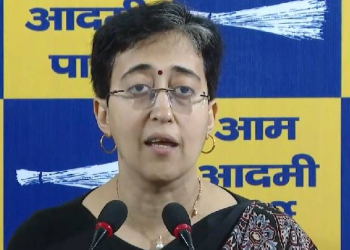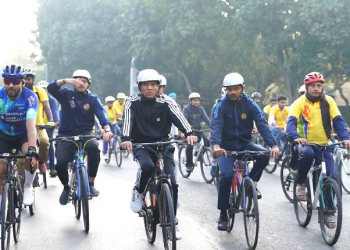Chennai: The February 19 urban local body elections in Tamil Nadu are turning out to be crucial for the ruling DMK, as the party wants to stamp its authority in the state by scripting continuous victories in electoral hustings.
The DMK commenced its winning spree in the 2019 general elections when the party-led United Progressive Alliance (UPA) won 38 of the 39 seats at stake inn the southern state.
It was a landslide for the DMK and its allies, given that the party was facing a major election for the first time after the demise of its patriarch, M. Karunanidhi.
The 2019 rural local body elections turned into another major show of strength between the DMK-led front and the AIADMK-led front. The DMK front won comfortably and it was a major show of strength by the emerging M.K. Stalin, who proved his mettle in the elections.
R. Padmanabhan, Director, Socio-Economic Development Foundation, a Madurai-based think-tank, told IANS, “The DMK emerged as a major political force in the back-to-back elections in 2019. These elections led to the emergence of Stalin as a major political leader of Tamil Nadu after the demise of his father and patriarch of DMK, the late M. Karunanidhi.”
After the general elections and the subsequent rural local body elections in 2019, the state went into the high-stake Assembly polls in May 2021.
In the Assembly elections, the DMK-led Secular Progressive Alliance (SPA) won with comfortable majority against the AIADMK-led front, and returned to power in the state after a gap of a decade with Stalin getting anointed as the Chief Minister of Tamil Nadu.
While the DMK-led alliance won 159 seats in the Assembly elections, the AIADMK-led front National Democratic Alliance (NDA) had to remain contend with 75 seats.
The Secular Progressive Alliance got 45.38 per cent of the total votes polled, while the National Democratic Alliance (NDA) managed only 39.72 per cent of the vote share.
The victory of the DMK-led front in the 2021 Assembly elections provided a major fillip to the politics propagated by the party and the DMK leadership tried to bring in several developments in the state on all fronts.
Immediately after assuming power in May 2021, the DMK-led front had a major challenge in store with the rural local body elections scheduled in the nine new districts of Tamil Nadu.
Just like in the previous occasions, the DMK-led front won the rural local body polls in nine districts with a thumping majority, with the AIADMK-led front biting the dust.
With such an authority in the politics of Tamil Nadu, the million-dollar question now is whether the DMK can repeat its performance in the 2022 urban local body elections which are being held after a decade.
Uma Maheswari, political scientist and professor at a private college in Chennai, told IANS, “The urban local body elections cannot be a cakewalk for the DMK front. Two things are to be taken into account. First, some unkept promises of the DMK, including the cancelation of NEET, Rs 1,000 in the accounts of housewives and poor quality items in the gift hampers of Pongal, have reduced the popularity of the party by a few notches.
“This, however, does not mean that the DMK will lose… What I am saying is the victory will not be that easy. Secondly, the AIADMK and BJP have snapped their alliance and this move will help the minority Muslim votes come back to the AIADMK while the BJP can test waters in the state on its own. However, taking all these factors into account, the DMK still has a much larger chance to win the urban local body polls as compared to the the AIADMK-led front.”
The PMK and the BJP have snapped their election tie-up with the AIADMK, though the saffron party has categorically stated that the party would continue the alliance in the 2024 general elections.
With the urban local body polls being held after a decade and with the general possibility of the party in power in the state holding an edge in the local body elections, the DMK-led front stand a major chance to win the polls.
If the party-led front wins the urban local body elections with a considerable margin, it can easily stamp its authority in the political structure of the state.
(IANS)



















